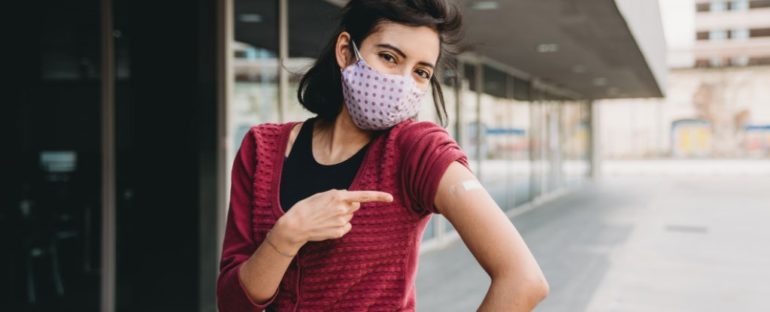To people who reject mainstream views and want to stand out from the masses, conspiracies can be appealing. But new research suggests that conspiratorial thinkers reluctant to get vaccinated are not totally immune to social norms: They may even change their minds when their friends and family openly approve of vaccines.
“It’s worth keeping social bonds instead of rejecting close others who are susceptible to conspiracy beliefs,” social psychology researcher Kevin Winter from the University of Tübingen in Germany, who led the study, explains on Twitter.
“When close others approved of the COVID-19 vaccination,” Winter and his colleagues write in their paper, “people with high conspiracy mentality were as willing to get vaccinated against COVID-19 as those with low conspiracy mentality.”
While health workers remain the most trusted advisors of vaccination decisions, according to the World Health Organization (WHO), this new research suggests the views of family and friends can be influential, too.
Vaccine hesitancy is nothing to scoff at, listed by the WHO in 2019 as one of the top 10 threats to global health.
Mid-pandemic, with new vaccines thrust into the spotlight, understanding what can be done to encourage more people to get vaccinated – to protect themselves and others from falling dangerously ill with COVID-19 – is more critical than ever.
Research has shown strong links between conspiracy thinking and anti-vaccine attitudes, where stronger conspiratorial thinking drives down vaccine acceptance.
But vaccine-hesitant people prone to believing conspiracy theories could still be swayed by those around them, or benefit from talking about concerns with trusted sources.
“People are social animals, heavily influenced by their perceptions of the beliefs and attitudes of close others” such as friends and family, the researchers write. “These perceptions are often referred to as a ‘subjective norm.'”
Previous research by Winter and colleagues suggests, however, that belief in conspiracy theories about COVID-19 goes hand in hand with less social engagement and lower trust in government institutions – so connecting with people dabbling in conspiracy communities might be hard to do.
Nevertheless, in their new study, the team investigated the interplay between a person’s conspiracy mentality, attitudes towards vaccines, and their perception of what close friends and family think about vaccination.
A total of 1,280 adults – who identified as vaccine-hesitant but weren’t totally against vaccination – were recruited across five studies, two conducted in a lab and three online.
Participants were questioned about attitudes to vaccines they might need in real-world or hypothetical scenarios, such as travelling to a foreign country, to protect their child from hepatitis B, or protect themselves against influenza or COVID-19.
People were also asked to estimate what they thought their loved ones might think they should do in each case.
A merged analysis of the five studies suggests that if people with a conspiracy mindset perceived their social circle as being supportive of vaccines, this appears to trump their conspiracy beliefs as a factor in shaping intentions to vaccinate.
“Our findings suggest that when friends and families approve of a vaccination, conspiracy beliefs no longer play a role in predicting vaccination intentions,” Winter told PsyPost.
Rather than trying to persuade people who believe in conspiracy theories otherwise, it might be enough for family and friends to signal their support of vaccines.
“When talking, for instance, about the COVID-19 vaccination, it could be a first step to reveal one’s own positive vaccination intentions to close others who endorse conspiracy beliefs,” Winter and colleagues suggest.
These are helpful insights on how to deal with vaccine hesitancy that has its roots in conspiracy beliefs.
But the study has its limits. It only suggests a link between vaccine intentions and close relationships, and it doesn’t show that shifting conversations among friends and families would actually change vaccination intentions.
Also, the reasons why someone may be hesitant about vaccinations are complex, something which was not captured in this study. It can depend on personal circumstances, such as employment insecurity and access to healthcare, or stem from past experiences of the medical system.
The study also didn’t include people who said they reject all vaccines outright, so the findings might not hold true in extreme cases, especially when there’s evidence suggesting that people with stronger conspiracy beliefs are less affected by social norms, according to the study authors.
“Subjective norms might be helpful to reach those on the edge to conspiracist beliefs but might be less effective among those who are deeply enmeshed in fringe conspiracy communities,” the team concludes.
At the end of the day, though, we’re all in this pandemic together. We need as many people as possible getting vaccinated – and encouraging others to do so.
Research suggests emphasizing how vaccinations can protect individuals against serious illness might be more effective than appealing to the collective good.
Listening to people’s concerns, sharing personal stories and not being judgmental are also good strategies.
The research was published in the British Journal of Health Psychology.



